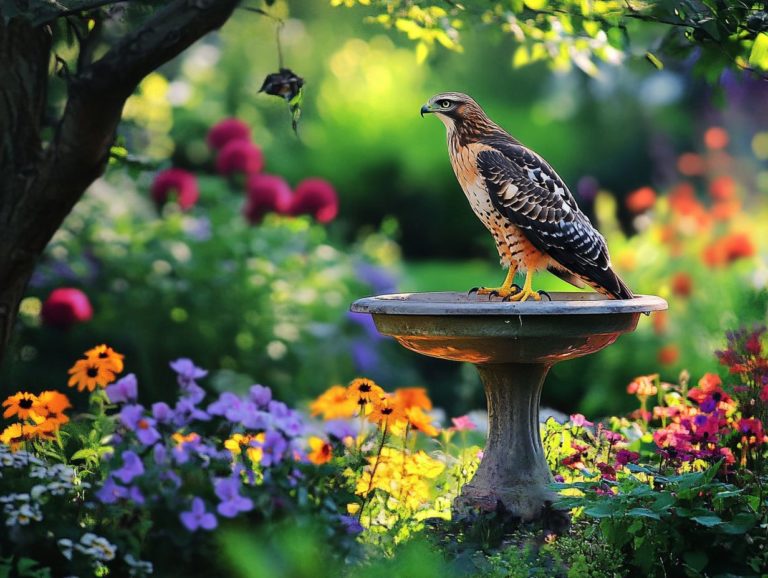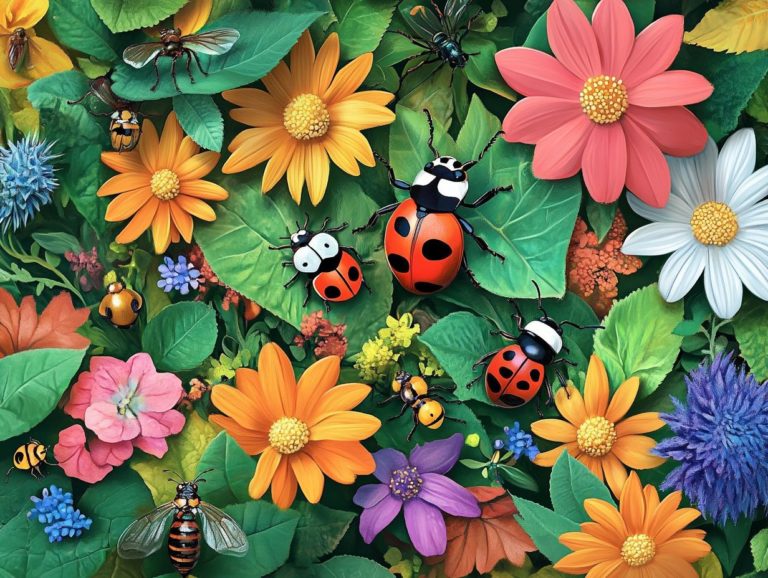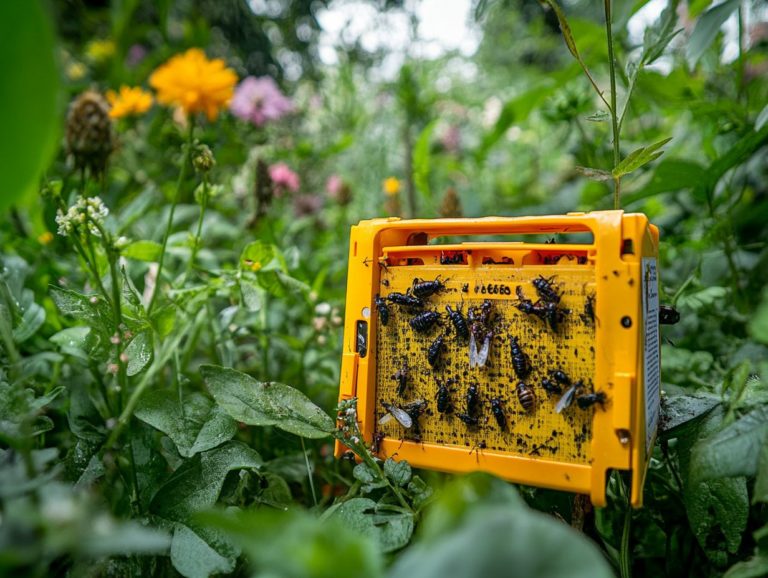5 Seasonal Pest Management Tips for Your Garden
Gardening can truly be a rewarding endeavor, yet it often presents the challenge of confronting pesky pests. From aphids to beetles, your ability to identify and manage these invaders is critical for nurturing a thriving garden.
Discover five essential tips for seasonal pest management, which include:
- Identifying common garden pests in your area and understanding their environmental impact.
- Maintaining your garden effectively.
- Employing natural pest control methods, including organic pest control solutions.
- Learning how to attract beneficial insects.
- Understanding the advantages of crop rotation and companion planting.
Let s transform your garden into a flourishing paradise! Dive into these helpful tips!
Contents
- Key Takeaways:
- 1. Identify Common Garden Pests in Your Area
- 2. Practice Good Garden Maintenance
- 3. Use Natural Pest Control Methods
- 4. Attract Beneficial Insects
- 5. Rotate Crops and Plant Companion Plants
- What Are the Most Common Garden Pests and How to Identify Them?
- Frequently Asked Questions
- What are the top 5 seasonal pest management tips for my garden?
- How can I keep my garden clean to prevent pests?
- What are some natural pest control methods for my garden?
- Why is it important to rotate my crops for pest management?
- How can I protect my plants from pests using row covers?
- Why is it important to regularly monitor my garden for pests?
Key Takeaways:

- Identify common garden pests in your area to properly address and prevent infestations.
- Practice good garden maintenance techniques to keep pests at bay, such as removing debris and weeds.
- Use natural pest control methods, like insecticidal soaps and neem oil, to minimize harm to beneficial insects and the environment.
1. Identify Common Garden Pests in Your Area
Identifying common garden pests is an essential step in your journey toward effective pest management. By doing so, you can implement targeted strategies that minimize damage while fostering a healthy garden ecosystem.
Local knowledge about seasonal pests, such as aphids and caterpillars, greatly enhances your ability to identify these nuisances and informs the use of Integrated Pest Management (IPM) practices, which focus on sustainable methods to control pests.
You ll find various methods for detecting these unwelcome guests. Start with visual inspections to spot distinctive signs, like chewed leaves or tiny holes in your plants. Traps can also prove highly effective consider using yellow sticky cards for aphids or pheromone traps for moths.
In warmer regions, watch for spider mites, while cooler areas might struggle with slugs during damp seasons.
Understanding the life cycles and behaviors of these pests, including their breeding patterns and feeding preferences, is vital for crafting effective control measures. This knowledge helps you minimize the need for harmful chemicals and supports your commitment to sustainable gardening practices.
2. Practice Good Garden Maintenance
Practicing good garden maintenance is essential for ensuring your garden remains healthy and pest-free. By creating an environment that nurtures beneficial insects while minimizing conditions that attract harmful ones, you set the stage for thriving plants. To be aware of potential issues, recognize the 5 signs of pest infestation in your garden.
Regular weeding is one of the simplest yet most powerful strategies at your disposal. Reducing competition for resources helps maintain soil health and keeps your garden vibrant.
Proper watering techniques whether utilizing drip systems or thoughtfully hand-watering are crucial for preventing water stress in your plants and encouraging deep root growth.
Enhancing soil quality through organic amendments boosts nutrient availability, fostering robust plant development. Engaging in cultural controls like crop rotation and companion planting will further support your pest management efforts. These practices allow you to cultivate a balanced ecosystem where beneficial species thrive and harmful pests are kept at bay.
3. Use Natural Pest Control Methods
Utilizing natural pest control methods is an effective way to tackle pest issues while embracing eco-friendly solutions and organic gardening techniques that protect both the environment and the health of your garden ecosystem.
These approaches often involve introducing beneficial insects, like ladybugs, which naturally feast on aphids and other harmful pests. By using organic fertilizers, you can enhance soil health, making your plants more resilient against infestations.
While chemical controls might promise quick fixes, they often harm surrounding wildlife and soil health, disrupting the natural order. Recognizing the significance of these ecological impacts encourages you to adopt a more sustainable gardening approach, promoting not just immediate outcomes but long-term vitality for both your plants and the environment.
4. Attract Beneficial Insects

Attracting beneficial insects to your garden is an essential part of a holistic pest management strategy. It enhances your garden’s ecology by promoting a natural balance that minimizes the need for chemical controls.
Consider incorporating plants like Marigolds. They brighten your landscape and attract ladybugs, which are known for their appetite for aphids.
The delightful blooms of dill and fennel invite parasitic wasps. These tiny allies help keep caterpillar populations down.
By thoughtfully employing companion planting, you can cultivate a flourishing environment that supports beneficial insects while improving soil health, enhancing pollination, and increasing overall productivity. This symbiotic relationship nurtures a more resilient ecosystem, enabling your crops to thrive while naturally addressing pest challenges.
5. Rotate Crops and Plant Companion Plants
Implementing crop rotation and companion planting strategies can significantly enhance the health of your soil quality. They effectively prevent seasonal pests and minimize damage in your garden.
These methods disrupt the life cycles of harmful pests, leading to a notable reduction in their populations. They also promote the growth of beneficial microorganisms in the soil.
Rotating crops helps the soil replenish its nutrients since different plants draw on various resources. Companion planting provides natural pest deterrents; for example, certain flowers attract predatory insects that feast on aphids and other nuisances.
When used together, these techniques cultivate a resilient ecosystem, enhance biodiversity, and foster a more productive and sustainable gardening experience.
What Are the Most Common Garden Pests and How to Identify Them?
Understanding the most common garden pests and how to identify them is essential for effective pest management. This knowledge enables you to act swiftly, mitigating pest damage and protecting your precious plants.
By recognizing species like aphids tiny, soft-bodied insects that love to cluster on new growth you can ensure early intervention. Spotting the unmistakable signs of whiteflies, which may leave a sticky residue on your leaves, also helps.
Other nuisances, such as caterpillars, often announce their presence through shredded foliage, while spider mites make themselves known with fine webbing.
Each pest has its own seasonal rhythm, flourishing in warm weather or seeking refuge during cooler months. By educating yourself on these variations, you enhance your proactive measures and sharpen your ability to identify pests accurately, which can help you implement 5 steps to reduce pest pressure in your garden, nurturing a healthier, more vibrant garden.
What Are Some Natural Pest Control Methods?
Explore natural pest control methods that not only protect your garden but also keep it healthy. These eco-friendly solutions can manage pest populations effectively, without harmful chemicals!
One effective approach is using biological controls, which means introducing natural predators like ladybugs to keep pest numbers in check.
Additionally, organic gardening techniques like applying neem oil act as a potent deterrent against various pests while remaining safe for beneficial insects. These methods have gained recognition for their effectiveness, creating a sustainable pest management system that protects your crops and nurtures the environment, ensuring your garden thrives for years to come.
How Can Beneficial Insects Help with Pest Management?

Beneficial insects are essential allies in your quest for effective pest management. They naturally keep pest populations in check while keeping your garden healthy.
Invite ladybugs and lacewings into your garden. These natural predators actively target harmful pests like aphids and spider mites.
Take ladybugs, for example. They can devour hundreds of aphids in just one day, dramatically lowering pest numbers without chemicals.
Lacewings, often called ‘aphid lions’ in their larval stage, feast on a variety of soft-bodied insects.
Encouraging these insects reduces your reliance on chemical pesticides. This approach leads to a healthier, more resilient garden.
The result? Stronger plants and a vibrant ecosystem that enhances your gardening experience.
What Are the Benefits of Crop Rotation and Companion Planting?
Crop rotation and companion planting offer many benefits. They enhance soil quality, reduce pest infestations, and increase crop yields.
These practices work on the idea that diversifying crops disrupts the life cycles of pests that thrive in monoculture settings.
By alternating crop types in specific fields, you can effectively hinder pest reproduction.
Certain plants, when grown together, create a natural barrier against pests, boosting plant health.
For example, pairing tomatoes with basil not only elevates flavor but also keeps harmful insects at bay.
This synergistic relationship fosters healthier growth conditions and leads to sustainable farming practices.
How Can a Garden Be Maintained to Prevent Pest Infestations?
Maintaining your garden with proactive prevention strategies is essential for warding off pests. This keeps plants healthy and reduces the need for chemical pest management solutions.
Regular garden inspections are crucial. They help catch potential issues early and ensure plant health.
During inspections, watch for leaf health. Look for discoloration or damage that might indicate pest activity.
Implementing an effective irrigation system is vital. It provides the right amount of water without risking over-saturation, which can lead to root rot.
Don t overlook soil health checks. Testing for nutrient balance gives insights into how well your plants can thrive.
By weaving these practices into your garden routine, you can cultivate a thriving ecosystem that naturally resists pests, following guidelines on how to create a pest-free zone in your garden.
Top Practices for Pest Management in Your Garden
Best practices for seasonal pest management hinge on your understanding of pest life cycles and using specific methods to prevent pests that align with organic pest control principles. This approach ensures effective mitigation while safeguarding the environment.
By keenly observing the changing seasons, you can pinpoint when specific pests are likely to emerge. This allows you to respond in a timely manner. Implementing a pest management schedule for your garden is a proactive strategy that minimizes potential damage and fosters a balanced ecosystem by steering clear of harmful interventions.
You can also use techniques such as introducing beneficial insects, utilizing companion planting, and applying organic sprays throughout the year. For more detailed strategies, check out these 5 steps to create a pest-resistant garden and adjust your methods as different pests peak during specific months.
- For example, planting marigolds in spring can deter nematodes.
- Organic neem oil can be applied in late summer to combat aphid populations.
By consistently tailoring these practices, you ensure a thriving environment for both plants and wildlife.
Frequently Asked Questions

What are the top 5 seasonal pest management tips for my garden?
The top 5 seasonal pest management tips for your garden are:
1) Keep your garden clean and free of debris. 2) Use natural pest control methods like companion planting and beneficial insects. For more detailed advice, check out these 5 tips for seasonal soil preparation.
3) Rotate your crops to prevent pest infestations. 4) Use row covers to protect your plants. 5) For more effective strategies, follow these 5 tips for maintaining a pest-free vegetable garden by monitoring your garden regularly for signs of pests.
How can I keep my garden clean to prevent pests?
You can keep your garden clean by regularly removing dead plants, fallen leaves, and other debris. This will eliminate potential hiding spots and breeding grounds for pests, and incorporating the top 10 tips for organic pest management can further enhance your efforts.
What are some natural pest control methods for my garden?
Some natural pest control methods include companion planting, which involves planting certain plants together to repel pests. You can also use beneficial insects like ladybugs and praying mantises to eat harmful pests.
Why is it important to rotate my crops for pest management?
Rotating your crops helps to prevent pests from becoming established in your garden. Pests often lay eggs or overwinter in the soil. By moving your plants to different locations, you disrupt their life cycle and reduce their population.
How can I protect my plants from pests using row covers?
Row covers are a physical barrier that can protect plants from pests. They are made of lightweight fabric and can be placed over plants to prevent pests from reaching them. Row covers also help retain moisture and create a microclimate that promotes plant growth.
Why is it important to regularly monitor my garden for pests?
Regularly monitoring your garden for pests allows you to catch and address any infestations early on. This can prevent significant damage to your plants and help you implement effective pest management strategies before the problem becomes too severe.
Start implementing these pest management strategies today for a healthier garden!






